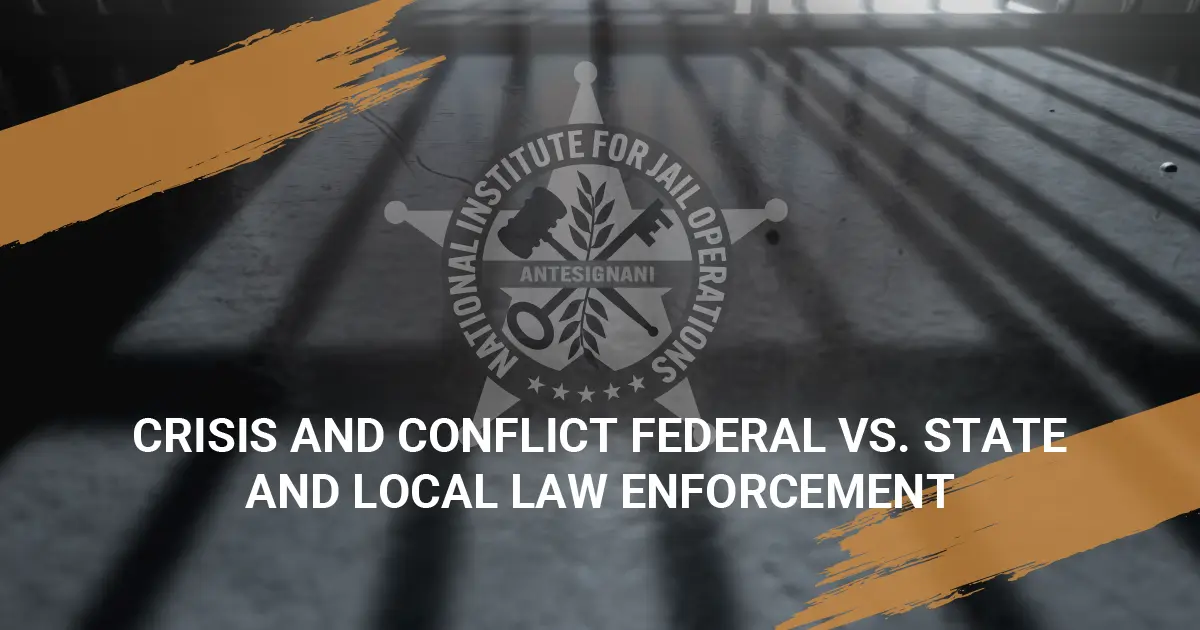by Stan Ellsworth
I believe The Constitution to be an inspired document. It was written to divide and balance the powers of government between the States and the newly created federal entity. At that time, federalism was spelled with a lowercase “f”. Times have changed. After the war between the States, and during the “progressive era”, the “New Deal”, and the “Great Society”, federalism has since been capitalized. The Powers retained by the States (and by the people) have been under relentless attack by the very federal entity they created.
One of the most egregious usurpations is the federal exercise of police authority and criminal justice. Our Constitution gives the federal government no such authority. In America, crime fighting is the responsibility of state and local government. Despite the lack of Constitutional authorization, federal representatives continually try to involve themselves in crime fighting. An ineffectual and self neutering congress has already created over 50 different law enforcement bureaus, departments, and administrations- all without Constitutional authority! And then we see how a hyperbolic and hysteonic congress will over react whenever a heinous crime is committed against a racial minority, or against gay people, or against certain religious minorities. These crimes set off a firestorm of new demands for federal ‘‘hate crime” legislation. Our congress in Washington is quick to don their “superhero” capes and spandex and jump right down the rabbit hole! Ignoring the fact that homicide and other violent crimes are already illegal under state law, and are vigorously prosecuted. The time, energy, and money spent on the symbolic enacting of a redundant federal law would be better used to improve state criminal justice systems, benefiting all victims of violent crime and the community at large.
This rampant federalization of crime is a danger to public safety and constitutional liberty. The creation of duplicate federal offenses subjects citizens to double jeopardy. In some cases, people who have served time in state prison, have been retried under federal law and sent to federal prison for a lengthy mandatory sentence. In other cases, people acquitted in state courts have been re-prosecuted in federal court.
Self-empowering federal courts have refused to stop such blatant injustices and have ruled that as long as there is one legal element in the federal offense that is not part of the state offense ( that the crime somehow affects interstate commerce), the second prosecution will be allowed. That legal position destroys the Fifth Amendment’s double jeopardy clause.
Second, enforcing “a one-size-fits-none” federal law on the 50 states subverts the state’s ability to make laws based on local conditions. Local Sheriff and police departments spend local tax dollars and are directly accountable to local voters, and are more in tune with local situations. In contrast, federal law enforcement spends from a vast pool of
‘‘other people’s money’’ and is, at best, subject to very ambiguous bureaucratic control that historically has little concern for local custom or condition.
Finally, and perhaps most alarming and important, the federalization of policing has led to the militarization of policing. And those 50 separate federal agencies and departments that deal with law enforcement and criminal justice are armed to the teeth and ready for war! Doing little to improve an already explosive atmosphere of us against them. But, damn, does it ever make for good tv and movies!
It was not long ago that police officers were known as ‘‘peace officers.’’ But since the 1990s the federal government has conducted a successful campaign to militarize only federal agencies, but limit access of state and local law enforcement to enhanced ordnance and equipment, making local law enforcement dependent on the federal agencies. That militarization has led to the loss of innocent life— most famously, in the well-publicized disasters at Waco and Ruby Ridge. Such dire consequences are the result of a dangerous trend; the expansion of the power of federal criminal justice far beyond its legitimate constitutional limits. While it is true that law and order begin at the top, the most important criminal justice reform that Congress can make is to return federal law enforcement to its Constitutional role.
The Constitution specifically authorizes federal enforcement of only three types of laws, “To provide for the Punishment of counterfeiting. “To define and punish Piracies and Felonies committed on the high Seas, and to impose punishment for Treason.” While the Constitution grants only narrow criminal law enforcement powers to the federal government, the Bill of Rights, in the Tenth Amendment, specifically reserves to the states all powers not granted to the federal government. The authors of the Federalist Papers, arguing for increased federal power, made it clear that criminal law enforcement would fall outside the purview of the federal entity under the new Constitution. James Madison wrote that federal powers ‘‘will be exercised principally on external objects, as war, peace, negotiation, and foreign commerce. . . . The powers reserved to the several states will extend to all objects which, in the ordinary course of affairs, concern the lives, liberties, and property of the people, and the internal order, improvement, and prosperity of the state.’’ Likewise, Alexander Hamilton, the most outspoken nationalist of his day, believed that state governments, not the federal government, would have the power of law enforcement, and that power would play a major role in ensuring that the States were not overwhelmed by the federal government: ‘‘There is one transcendent advantage belonging to the province of the State governments, which alone suffices to place the matter in a clear and satisfactory light— I mean the ordinary administration of criminal and civil justice.’’
Madison and Hamilton were right to recognize that law enforcement is properly a local matter. In the Ruby Ridge tragedy, for example, would the local Idaho authorities have tried to arrest Randy Weaver with that kind of violence and aggression? In the Waco situation, would the local sheriff’s department have stormed the compound, or instead have waited to arrest and question David Koresh next time he came to town for supplies, as was his frequent custom? I believe that local policing by Sheriffs and other local law enforcement interacts differently with local people, to the benefit of all.
The constitutional system created by Madison, Hamilton, and the other Founders, and ratified by the American people, was radically altered over the course of the 20th century. The clearly enumerated powers of Congress have been interpreted to be congressional powers over issues that have nothing to do with those enumerated powers… taxes and interstate commerce. Too often, the partisan debate on crime control misses the larger issue of the proper scope of federal power. The trend toward centralization of criminal justice authority in Washington has put America on a road that will lead to a de facto national police force, an entity of unparalleled danger to civil liberty. In two separate and recent cases, the Supreme Court affirmed that Congress’s power to “regulate commerce . . . among the several states” is not a power to create federal laws over local crimes. That Congress continues to discuss and enact criminal statutes in defiance of plainly stated Supreme Court precedent is an affront to the rule of law and a violation of Constitutional trust.
Next Up: The Role of Sheriff in a Constitutional Republic



